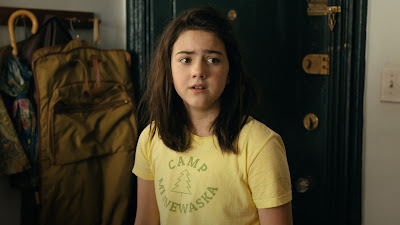“Are You There, God? It’s Me, Margaret” begins with its eponymous character at summer camp, recounted swiftly in a blissful montage evoking the last flush of innocence before the overwhelming creep of doubt and insecurity. Then again, that doubt and insecurity does not creep up on Margaret so much as just get dropped in her lap before she’s barely off the camp bus, her mother Barbara (Rachel McAdams) advising of their impending move as they navigate by foot through traffic with luggage to her double-parked car, putting into perspective how Fremon Craig frequently employs situation to illuminate interiority. Margaret’s changing body, then, is yoked to her family’s move, meaning she must navigate two unknowns at once.
Almost as soon as Margaret walks in her New Jersey door, Nancy Wheeler (Elle Graham) from the down street asserts her presence. The introduction’s instantaneousness is acute, demonstrating how Nancy takes control of this new arrival, folding her into a clique even as Margaret eventually yearns to break free of it, growing disenchanted with their treatment of outsiders. That includes Laura Danker (Isol Young), ostracized because puberty has hit early, victimized by the very thing everybody wants, brutal irony as petty jealousy. At the same time, though, this clique functions as a safe space, even a kind of makeshift classroom, where they hunger for all the knowledge being strained out of their buttoned-up sex ed talks. The scene in which the quartet gathers around an adult magazine belonging to Margaret’s father Herb (Benny Safdie) feels like the version of the movie we’ve seen a thousand times flipped upside-down, girls trying to understand the reality of their own bodies through images of women’s bodies that have no basis in reality.
If Margaret is adjusting, though, so, too, is Barbara, transitioning from art teacher in the city to PTA mom in the ‘burbs, volunteering for so many committees that she runs herself ragged. That this is not so much a subplot intertwined with Margaret’s main story as something akin to a parallel main story to Margaret’s is apropos, a mother struggling to define herself as something more than just that, crossing her own threshold when she finds the wherewithal to heroically just say no. McAdams’s performance is one to behold, expressing the internal anguish of emotionally struggling, echoing the slapdash nature of her furniture-less living room when she stands there opposite Nancy’s impeccably arranged mother (Kate MacCluggage), yet externally never failing to express the love and attention that Margaret needs.
Barbara has been essentially disowned by her strict Christian parents for marrying the Jewish Herb and as a result, mother and father have chosen to raise Margaret without religion, meaning the conversation she begins with God also starts something like a religion walkabout. She attends Temple, visits a Catholic confessional, even takes a turn at the Pentecostal service of a friend, never quite finding what she needs, confessing to God that she feels Him most when she’s alone, a line linking this journey to her own journey of self. Though Fremon Craig tends to tie bows on some narrative through-lines, like that of Laura Danker, who I wished the movie itself had looked at with a bit more curiosity than the Nancy Wheeler cadre, overall, “Are You There, God? It’s Me, Margaret” elides easy answers. Nature run its course, literally, a hero’s journey in which menstruation emerges as the elixir, the culmination of the quest, which feels as radical as its presentation on screen is matter of fact.





No comments:
Post a Comment